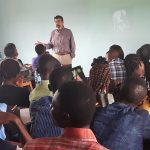A busy week of teaching concluded my assignment in Nigeria. On Monday and Tuesday, I worked with the institute’s apiculture instructors. Officially, my mission here is training the trainers. Though I have had quite a bit of contact with students, working with the staff has been my priority.
Over the years, I have developed a set of PowerPoint presentations for beekeeping classes and meetings. I am constantly updating and adapting them for particular audiences. After spending my first few days here getting familiar with African bees, top bar hives, and their approach to beekeeping, I made some more revisions.
Little changed was the first segment: honeybee biology. I added more information about honey bee classification, and subspecies. Which will be the subject of a future post. When managing or caring for any type of animal, it is essential to have an understanding of how it functions when healthy, what its requirements are, and what diseases and other problems it may be susceptible to. That is true whether your interest is commercial (cattle, sheep, pigs) or loving (a pet dog, cat, or parakeet). The more an animal’s physiology resembles our own, the easier the task. Dogs and pigs are not too dissimilar. Cows are a different kind of beast, but they are still mammals. Birds (even the talking kind) are even more alien. Now consider for a moment what is involved in understanding and managing an insect. Give a thought to trying to diagnose a sick bug, or to figuring out why an entire hive of bees suddenly decides to run, or fly, away from home. Beekeepers call that absconding. You can look it up. The African subspecies of honey bee, the kind they have in Nigeria, abscond a lot. Just opening a hive can cause the colony to abandon it.
The group of instructors I worked with at the beginning of the week was small – four or five both days. Questions and answers played a big role in our interaction. It was difficult for me to determine what areas they really needed instruction in, but my PowerPoints were helpful in that. Rather than my giving presentations, we reviewed the slides together to prompt discussions. It certainly worked. We would spend two or three hours reviewing a 60 minute PowerPoint. At the end of the course I provided them with digital copies, along with some other materials that I had on my computer, and a set of photographs.
Unexpectedly, on Tuesday morning I awoke to find myself in the middle of what amounted to a wildcat strike by the university’s instructors. You can look this one up too, but my relatives and friends in the Eastern Kentucky coal fields know what it means. I had been told that there were issues here with the instructors not being paid on time, or at times not being paid at all. And I am certain that they are not highly compensated to start with. That was what the work stoppage was about. It started Tuesday and continued through the rest of the week, but fortunately it did not have an over whelming impact on my assignment here. Though not officially working, the instructors showed up on Tuesday, and the school did not lock them out. I asked one if he wasn’t on strike, and he said, “Yes, but with for you”.
On Wednesday I was supposed to speak to the apiculture students, but the school was officially closed due to the strike. Instructors called the students – just like their counterparts in the U.S., they ALL have cell phones – and told them that my talk was still scheduled. The class was standing room only, and there were more good questions. I enjoyed it immensely.
Thursday was the only day really affected by the strike. I was scheduled to speak that day to a general meeting, but it was cancelled. Unfortunate, but I feel that the important work was already done. I did have a fruitful meeting that day with the school’s carpenter to talk about hive construction. He was another example of dedication. He had a private pay job off campus, but he set that aside to come in and meet with me – without pay, because of the strike.
My assignment in Nigeria has come to an end, but not these posts. I intend to follow-up on some related topics, such as hive construction. Today I spent writing a report on my work here. Some of the observations and conclusions contained in it will also appear in on my web and face book pages.
Tomorrow I start my journey home, but I won’t be going back directly. Since I am on this side of the Atlantic, I might as well make another stop. I’m sure I can find some more bees before I touch American soil again.



